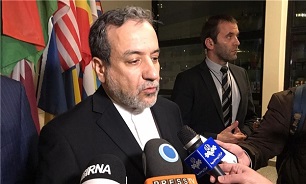Deputy FM Warns of Dire Impacts of US Sanctions on Iranian People amid Coronavirus Outbreak
 Araqchi made the remarks in a phone conversation with his Norwegian counterpart Tore Hattrem on Wednesday.
Araqchi made the remarks in a phone conversation with his Norwegian counterpart Tore Hattrem on Wednesday.
He referred to the outbreak of coronavirus and the importance of maintaining cooperation to fight the pandemic, and highlighted the adverse outcomes of the US unilateral sanctions against Iranian people in this hard situation.
Both sides also discussed holding next round of Iran-Norway political consultations in Oslo, regional developments like the Hormuz Peace Endeavor (HOPE) initiative as proposed by the Iranian President Hassan Rouhani, establishing peace in Afghanistan, the latest conditions in Iraq and the importance of continuing humanitarian aid to Yemen.
They also reviewed the outbreak of coronavirus in the world, bilateral ties, regional and international developments.
Hattrem, for his part, expressed solidarity with Iranian government and people in fighting coronavirus.
The diplomat underlined Norway’s multilateral policy in the international arena, helping international bodies with regard to people’s health and continuation of consultations with Iran for establishing security and stability in the Persian Gulf and West Asia.
The Iranian health ministry announced on Wednesday that 94 people infected with COVID-19 virus have lost their lives in the past 24 hours, while over 63,000 patients have been treated so far.
“1,194 more patients infected with COVID-19 virus have been identified in the country since yesterday based on confirmed diagnosis criteria,” Health Ministry Spokesman Kianoush Jahanpour said on Wednesday.
He said that the total number of coronavirus patients in Iran has increased to 85,996, adding that 5,391 people have lost their lives due to infection to the virus, including 94 in the past 24 hours.
Jahanpour, meantime, said that 63,113 infected people have been treated and dismissed from hospitals, expressing concern that 3,311 patients infected with COVID-19 virus are in critical conditions.
He also noted that 377,396 coronavirus diagnosis tests have been carried out in the country so far.
Iranian Health Minister Saeed Namaki stressed on April 7 effective measures to control coronavirus epidemic, expressing the hope that the disease would be controlled in Iran by late May.
“At present, the country is in the phase of disease management and we should not imagine that we have reached the harness and control phase. Today is the time for full-fledged combat against the virus. God willing, we will control coronavirus by late May. The virus should be controlled in the minimum possible time,” Namaki said, addressing the Iranian legislators in an open session of the parliament in Tehran.
He noted that at least 30% to 50% of hospital beds are still vacant across Iran and nearly 15,000 beds are ready to keep the patients who are recovering from coronavirus disease.
“We have now moved down to tank 6th in terms of deaths,” Namaki said, adding that the country’s situation in treatment of patients will improve in the next few days.
The coronavirus COVID-19 is affecting approximately all countries and territories around the world. The virus was first reported in the central Chinese city of Wuhan late last year. It has so far killed more than 184,300 people and infected over 2.64 million others globally.
The Iranian foreign ministry declared that despite Washington’s claims of cooperation to transfer drugs to Iran via the new Swiss-launched payment mechanism, the US is troubling the process amid the coronavirus outbreak in the country.
Although US claims that medicines and medical equipment are not under sanctions, they have practically blocked the transfer of Iran’s financial resources in other countries into the Swiss Humanitarian Trade Arrangement (SHTA), Iranian Foreign Ministry Spokesman Seyed Abbas Mousavi said.
As the death toll from the virus surges, Iran intensifies its preventive safety measures. Closures of schools and most universities have been extended until late April.
The government also imposed travel restrictions, specially on Iran’s North, which is among the red zones. The country has also adopted strict digital health control procedures at airports to spot possible infections.
Namaki announced last month that a new national mobilization plan would be implemented across the country to fight against the coronavirus epidemic and more effectively treat patients.
Namaki said that the plan will include all the 17,000 health centers and the 9,000 medical and clinical centers in all cities, suburban areas and villages.
He added that the plan will include home quarantine, noting that infected people will receive the necessary medicines and advice, but they are asked to stay at home.
said that people with a more serious condition will stay at the hospitals, adding that the public places will be disinfected, the entries of infected towns and cities will be controlled to diagnose and quarantine the infected cases.
He added that the necessary equipment and facilities have been provided, expressing the hope that the epidemic would be curbed.
According to the latest statistics of Health Ministry, the number of medical laboratories to test coronavirus infection has reached over 90 across the country.
The World Health Organization (WHO) says Iran's response to the virus has so far been up to the mark. Still, it says the US sanctions are a big challenge, and Washington would be complicit in the rising death toll in Iran if it would not remove its sanctions.
The World Health Organization has considered priorities in combating coronavirus and Islamic Republic of Iran obeys and follows up priorities as defined by WHO.
The WHO is dispatching separate delegations to all countries.
Message end/
